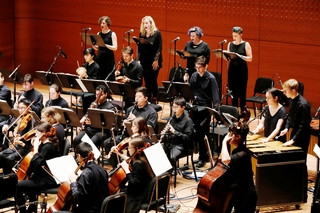|
Back
Elations and Hallelujahs New York
Alice Tully Hall
04/18/2019 -
Iannis Xenakis: Okho
Caroline Shaw: Entr’acte
Steve Reich: Tehillim
Mellissa Hughes, Nina Faia Mutlu (Lyric Sopranos), Kirsten Sollek (Alto), Elizabeth Bates (High Soprano), Benjamin Cornavaca, Leo Simon, Joseph Bricker (Djembe), Amelia Dietrich, Emma Frucht (Violins), Emily Liu (Viola), Clare Bradford (Cello)
AXIOM, Jeffrey Milarsky (Conductor)

S. Reich/C. Shaw
“I've been gearing up for this future of writing a lot of new music by digging into my favorite old stuff, and twisting it around and highlighting the things I really love.”
Caroline Shaw (1982-)
To paraphrase Béla Bartók, last night’s concert at Alice Tully Hall was a Game of Threes...and Fours...and Fours with Orchestra. The soloists and orchestra came from Juilliard. But as usual, this was hardly a school concert. Steve Reich was so impressed that he missed a Passover Seder to applaud the four singers and Juiliard’s AXIOM orchestra. Three percussion students took the incredibly complex Okho from Xenakis. And four string players took Carolyn Shaw’s beautiful paean to Joseph Haydn in Entr’acte.
Confession: I had never heard any of the works previously, so this first hearing, with such polished performers, was a special joy. Though when it comes to Carolyn Shaw, the word “joy” is superfluous. She is vocalist, violinist, and a composer from Greenville, No’th Cahl-eye-nah, where the music literally soaks up the atmosphere.
In this case, her Entr’acte was inspired by a strange Trio from the Minuet of Haydn’s last String Quartet. The music, yes, the advanced harmonies, and above all, the foreign key which Haydn used. I heard the original this morning and was entranced by it. But Ms. Shaw used this theme to set off a one-movement string quartet which breathed that joy.
The four players started with the theme, though here it had a modal key, almost a replica of Gibbons or Byrd. It was repeated several time, once with all the strings playing with buzzing minor seconds, but in between, her four players were busy with pizzicato sections, keening harmonics, glissandi, and unlikely combinations from all of the above.
Perhaps a second hearing, and I can put it all together structurally. But in this case, the music was so grand and delightful–ending (again unlikely) with a luscious cello solo by Clare Bradford–that the Entr’acte became an elation.
The opening was one of Xenakis’ works for percussion. It was written for the French Bicentennial, and oh, how I wish that either the three players (or Edward Gardner at his all-French London Philharmonic program last week) had mentioned the tragedy at Notre-Dame.
That said, the three player on three djembe (a Malian goblet-shaped drum, played with hands), did a good job in making the instruments sound...non-rhythmical.
Initially, one imagined that Steve Reich, also a devotee of West African drumming, could have written this. But Xenakis was not so easy. The three players worked with the most extreme counterpoint, and when one thought a rhythmical cell was to found, they broke the spell with a three-voiced BANG!! or two. Otherwise, this was Xenakis with severe mathematical equations about which we could only “hear” on paper.
The program notes by Matthew Mendez (brilliant, articulate, ideal for a Juilliard audience) suggested that Xenakis’s fascination with percussion is “a tension between logical and mythological, mechanical and intuitive.” May I humbly suggest that, when played in Alice Tully Hall, we also had a reverberation, the same kind of reverberation that Greek Tragedy would have had in amphitheaters like the echo-ey Syracuse (Sicily) theater? At any rate, it was surprising, inventive, memorable.

M. Hughes, N. F. Mutlu, K. Sollek, E. Bates with AXIOM
(© Michael DiVito)
I suppose that if one has to miss an opening night Seder, God will excuse if one listens to the Psalms. Steve Reich took three of the most joyous poems of David (Tehillim means “a song of praise”), and turned them into a work for four female voices and orchestra.
Written in 1981–a year before Caroline Shaw’s birth–the work did have a commonality with the Xenakis work for sheer percussiveness. Not loud percussion, but the drumming of hand-claps, soft rattles, and bells. Added to this were the four women’s voices, first in canonic form, then with sheer harmonies, with one voice (Elizabeth Bates) higher than the rest.
Originally it had a Chassidic/Semitic dance jauntiness, but Mr. Reich continued with the full orchestra underlying the four women intertwining their voices with praise, adulation and finally the “Hallelujah” of the 150th Psalm.
As always Jeffrey Milarsky conducted with clarity, precision and understanding.
Harry Rolnick
|